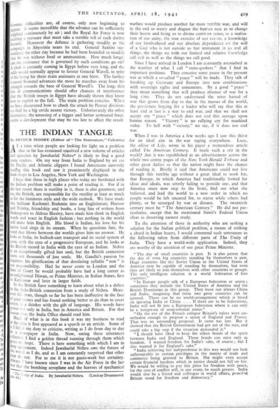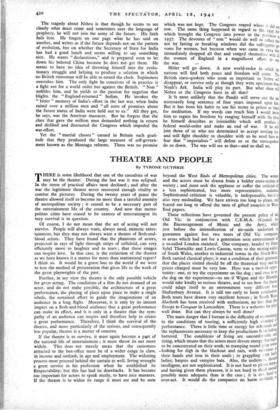THE INDIAN TANGLE
By ARTHUR MOORE (Editor of ,6 The Statesman," Calcutta) AT a time when people are looking for light on a problem that so far has remained unsolved a new volume of articles and speeches by Jawaharlal Nehru* -is likely to find a good many readers. On my way from India to England by air via the Pacific and Atlantic clippers I found Americans earnestly reading this book and saw it prominently displayed in the book shops in Los Angeles, New York and Washington.
I hope that those in high places who today are burdened with the Indian problem will make a point of reading it. For if in the last resort there is sterility in it, there -is also greatness, and we, the British, are responsible for the sterility at least as much as for the luminous -style and the wide outlook. We have made this brilliant ICashmiri-.Brahmin into. an Englishman; Harrow and Trinity, friendship and books, a long line of writers from Shakespeare to Aldous Huxley, have, made him think in English words and react in .English fashion ; but. nothing in the world will make him English. His blood is Indian, his love for his native land sings in its stream. When he. questions fate, the wind that blows between the worlds gives him no answer. He ooks at India, its bullock-cart transport and.its social system of caste, with the eyes of a progressive European, and he looks at the British record in India with the eyes of an Indian. Nehru Is an exceptionally . gifted lost. soul, but the British connexion rns out thousands .of Jost souls. Mr. Gandhi's passion for negation, his-glorification of that desolating. syllable " non " is our responsibility. Had .he never come to London and the of Court he would probably have had a long career as an enlightened Diwan, or Prime Minister, in Indian States, first in Kathiawar and later in larger fields. So the British raave something to learn about what is a defect in the Indo-British connexion from a study of Nehru. More- over this man, though so far he has been ineffective in the face of great events and has found nothing better to do than to court arrest, is a thinker with the gift of language. His words have Fewer not only in India, but in America and Britain. For that reason also, the India Office should read him. Much of what is in this book it was my business to read at the time it first appeared. as a speech or an article. Some of it I felt it my duty to criticise, writing as I do from day to day In a newspaper in India Nov, seeing these utterances collected, I find a golden thread running through them which ttets Inc hope. There is here something with which I am in deep agreement Indeed Jawaharlal Nehru sees the future of the world as I do, and as I am cons' tnntly surprised that other me,st do not. For to ..me it is not guess-work but certainty. An I have known since I was in the Air Force in the las!. war that the bombing aeroplane and the horrors of mechanical tz:Thed.)1.'14 of India. By Jawaharlal Nehru. (Lindsay Drummond warfare would produce another far more terrible war, and will in the end so weary and disgust the human race as to change their hearts and bring us to divine common sense, to a realisa- tion of our unity, the, true exercise of our reason, a knowledge of our brotherhood and our absolute dependence on the will of a God who is not outside us but immanent in us and all things, the things we with our limited and relative knowledge call evil as well as the things we call good.
Since I have arrived in London I am constantly astonished at the number of what I call ` statu-quokers " that I find in important positions. They conceive some pause in the present war at which a so-called " peace " will be made. They talk of breaking up Germany and Europe into new combinations with sovereign rights and armaments. By a good " peace " they mean something that will produce absence of war for a long time. They do not understand the utter hatred of war that grows from day to day in the masses of the world, the passionate longing for a leader who will say that this at least and at last is a war to end war, and that we shall not accept any " peace " which does not end this outrage upon human reason. " Victory " is no rallying cry for mankind today. To hell with " victory," we say, if it does not end war.
When I was in America a few weeks ago I saw this thirst for an ideal aim in the war raging everywhere. Luce, the editor of Life, wrote in his paper a tremendous article calked The American Century. It made such a stir in the weekl; that it was republished as an advertisement across the whole two centre pages of the New York Herald Tribune and other great dailies so that the nation might have the chance of reading it. Briefly it said that Americans could not live through this terrible age without a great ideal to work for, that Europe, to which, America had 'traditionally looked for ideas and ideals, was utterly failing to provide one, and that America must now step to the front, find out what she believed, and lead the world to a new order in which no people would be left uncared for, to starve while others had plenty, or be scourged by war . or disease. The twentieth century must be " The American Century." He did not par- ticularise, except that he mentioned Streit's Federal Union ideas as deserving earnest study.
To the attention of those in authority who are seeking a solution for the Indian political problem, a means of striking a chord in Indian hearts, I would commend such utterances as the following taken from different parts of The Unity of India. They have a world-wide application. Indeed, they are worthy of the attention of our great Prime Minister.
" The day of small countries is past. It is also patent that the day of even big countries standing by themselves is past. Huge countries like the-Soviet Union or the United States of America may be capable of standing by themselves, but even they are likely to join themselves with other countries or groups. The only intelligent solution is a world federation of free countries."
" In Europe people talk of a European federation or union ; sometimes they include the United States of America and the British Dominions in this group. They leave out always China and India, imagining that these two great countries can be ignored. There can be no world-arrangement which is based on ignoring India or China. . . . If there are to be federations, India will not fit into a European federation where it can only be a hanger-on of semi-colonial status."
" On the eve of the French collapse Britain's rulers were un- orthodox enough to propose a union of England and France. That was an astounding proposal. It came too late. But it showed that the British Government had got out of the ruts, and could take a big step if the situation demanded it." " L should have liked to keep the silken bonds of the spirit between India and England. These bonds can exist only in freedom. I wanted freedom for India's sake, of course ; but I also wanted it for England's sake."
" India achieving her independence in this way would not look unfavourably to certain privileges in the matter of trade and commerce being granted to Britain. She might even accept certain financial burdens which in justice should not fall on her. We would be willing to pay this price for freedom with peace, for the cost of conflict will, in any event, be much greater. India would also be a friend and colleague in world affairs, pr,Ivi.d.xl Britain stood for freedom and democracy." The tragedy about Nehru is that though he seems to see clearly what must come and sometimes uses the language of prophecy, he will not join the army of the future. His faith fails him. He forgets on one page what he has said on another, and writes as if the future depends not on the pattern of evolution, but on whether the Secretary of State for India has had a good lunch and seems willing to say something nice. He wants " declarations," and is prepared even to let down his beloved China because he does not get them. He seems to have no idea of throwing himself into the evolu- tionary struggle and helping to produce a solution in which no British statesman will be able to retard the clock. Supineness overtakes him. The only fight he conceives of in practice is a fight not for a world order but against the British. " Non " nobbles him, and he yields to the passion for negation that blights the " England-returned " Indian. He invokes the " bitter " memory of India's effort in the last war, when India raised over a million men and " all sorts of promises about the future status of India were held out to us." All they got, he says, was the Amritsar massacre. But he forgets that the class that gave the million men demanded nothing in return and disliked and distrusted the Congress which impeded the war-effort.
Yet the " martial classes " earned in Britain such grati- tude that they produced the large measure of self-govern- ment known as the Montagu reforms. There was no promise which was not kept. The Congress reaped where it did net sow. The same thing happened in regard to the 1935 Act which brought the Congress into power in the provinces in 1937. The devotees of " non " would do well to reflect that not by fasting or breaking windows did the suffragettes get votes for women, but because when war came in 1914 they immediately dropped all that and ranged themselves with all the women of England in a magnificent effort to win the war.
Hitler will go down. A new world-order in which the nations will find both peace and freedom will come. The British statu-quokers who seem so important to Nehru will disappear, or survive only as though they were specimens from Noah's Ark. India will play its part. But what share will Nehru or the Congress have in all that?
It Is most unlikely that the Pandit will serve out the un- necessarily long sentence of four years imposed upon him, But it has been his habit to use his terms in prison as times for meditation. If my words can reach him I would invite him to regain his freedom by ranging himself with the force he himself describes as irresistible which will produce a federal world-order and make an end of war. If he will join those of us who are determined to accept nothing lest and will fight shoulder to shoulder with us he need have no fear that " imperialists " will defeat us or the statu-quokers do us down. The war will see to that—and so shall we.



























 Previous page
Previous page